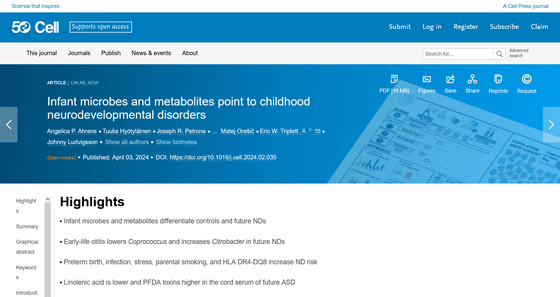Imbalances in gut bacteria early in life may be linked to risk of neurodevelopmental disorders later in life

A study by researchers at
Infant microbes and metabolic disorders point to childhood neurodevelopmental disorders: Cell
https://www.cell.com/cell/fulltext/S0092-8674(24)00238-1

Autism and ADHD are linked to disturbed gut flora very early in life
https://medicalxpress.com/news/2024-04-autism-adhd-linked-disturbed-gut.html
The research team followed up 16,440 people born in Sweden between 1997 and 1999 from birth through their 20s, and reported that 1,197 of them, or 7.3%, were diagnosed with ND.
Over the course of multiple studies over the children's development, a number of lifestyle and environmental factors were identified, and for some children, the composition of umbilical cord blood and fecal bacteria from one-year-olds were analysed.
Professor Jonny Ludvigsson of Linköping University, who led the research team, reported: 'Our study shows clear differences in the gut microbiome during the first year of life between children who go on to develop autism or ADHD and those who don't. We found an association between several factors that influence the gut bacteria, including antibiotic treatment during the first year of life, and an increased risk of these diseases.'
The research team claims that antibiotic treatment may be related to the fact that children who suffered repeated otitis media in the first year of life were found to have a higher risk of being diagnosed with developmental disorders later on. According to the research team, antibiotic treatment may disrupt the composition of the intestinal flora, resulting in the loss of normal bacteria such as the Citrobacter and Coprococcus genera, which may contribute to the onset of ND. Previous studies have also pointed out the possibility that the intestinal flora may be affected by antibiotic treatment and increase the risk of immune system-related diseases such as type 1 diabetes and pediatric rheumatism.

by Public Health Image Library
'Coprococcus and
The researchers also analyzed the levels of metabolic substances such as fatty acids and amino acids in the children's umbilical cord blood. They found that children who were later diagnosed with ND had lower levels of several fatty acids in their umbilical cord blood. One of these, linoleic acid , is known to have anti-inflammatory properties and is necessary for the production of omega-3 fatty acids, which have a variety of other effects in the brain.
In addition, the group of children diagnosed with ND had higher blood levels of fluorinated organic compounds (PFAS) than the control group. PFAS are also known as 'eternal chemicals' because they are extremely difficult to decompose, and have been shown to have various adverse effects on health. However, it is unclear whether PFAS is related to the risk of developing ND.

The research team noted that it is uncertain whether the associations observed in the Swedish children can be generalized to other populations, and further research is needed to determine whether an imbalance in the gut microbiota causes the onset of ND. However, even taking into account risk factors that may affect the gut microbiota, the research team argued that many bacteria were associated with future ND diagnosis, suggesting that gut bacteria may be a biomarker for early detection of children's future ND risk.
Related Posts:
in Science, Posted by log1i_yk







